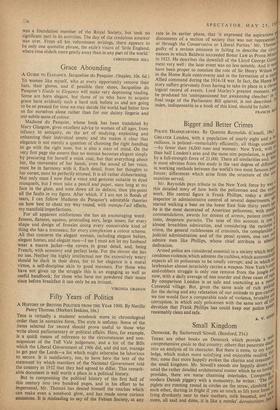Grace Abounding A GUIDE TO ELEGANCE. Jac q ueline du Pas q uier. (Staples,
10s. 6d.) To women like myself, who at every opportunity remove their hats, their gloves, and if possible their shoes, Jacqueline du Pasquier's Guide to Elegance will make very depressing reading. Some are born elegant, but those of us who have to acquire grace have evidently such a hard task before us and are going to be so pressed for time we may decide the world had better love us for ourselves alone rather than for our dainty lingerie and our subtle sense of colour. Madame du Pasquier, whose book has been translated by Mary Glasgow, gives excellent advice to women of all ages, from infancy to antiquity, on the art of studying, exploiting and enhancing their individual assets; and she makes it clear that elegance is not merely a question of choosing the right handbag to go with the right nose, but is also a state of mind. On the very first page she asserts that no woman becomes elegant simply by procuring for herself a mink coat, but that everything about her, the movement of her hands, even the sound of her voice. must be in harmony with it. Each detail, from her thoughts to her corset, must be perfectly attuned. It is all rather disheartening. Not only must I now find a voice and gestures suitable to dyed musquash, but I must take a pencil and paper, stare long at my face in the glass, and note down all its defects, then pin-point all the faults in my figure. After which, if I am not in floods of tears, I can follow Madame du Pasquier's admirable theories on how best to cheat my way round, with trompe-rwil effects.
my manifold imperfections. _
For all apparent misfortunes she has an encouraging word: fatness, flatness, squints, protruding ears, large noses; for every shape and design of females doing every conceivable kind of thing she has a trousseau; for every complexion a colour scheme. All that concerns the elegant woman, including elegant babies, elegant homes, and elegant men—I see I must not let my husband wear a mauve jacket—she covers in great detail, and, being French, with economy and perfect taste. For the sloven she has no use. Neither the highly intellectual nor the excessively weary should be slack in their dress, for to her elegance is a moral virtue, a self-discipline akin to good manners. For those who have not given up the struggle this is an engaging as well as useful handbook; for those who have not powdered their noses since before breakfast it can only be an irritant.
VIRGINIA GRAHAM










































 Previous page
Previous page